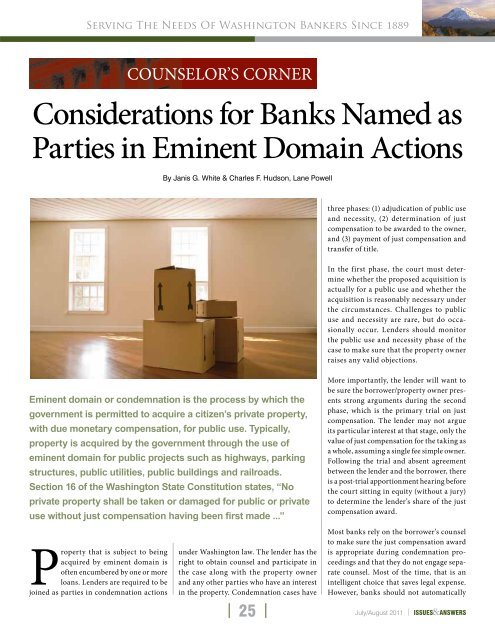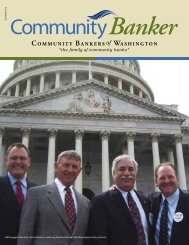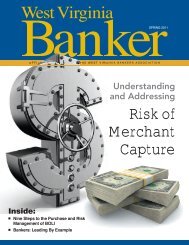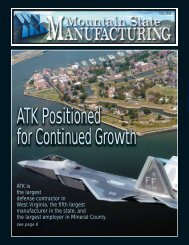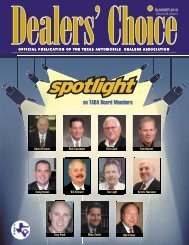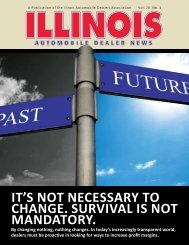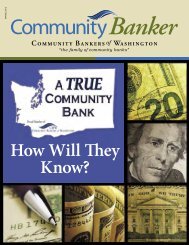official publication of the washington bankers association - Media ...
official publication of the washington bankers association - Media ...
official publication of the washington bankers association - Media ...
Create successful ePaper yourself
Turn your PDF publications into a flip-book with our unique Google optimized e-Paper software.
Serving The Needs Of Washington Bankers Since 1889<br />
COUNSELOR’S CORNER<br />
Considerations for Banks Named as<br />
Parties in Eminent Domain Actions<br />
By Janis G. White & Charles F. Hudson, Lane Powell<br />
three phases: (1) adjudication <strong>of</strong> public use<br />
and necessity, (2) determination <strong>of</strong> just<br />
compensation to be awarded to <strong>the</strong> owner,<br />
and (3) payment <strong>of</strong> just compensation and<br />
transfer <strong>of</strong> title.<br />
In <strong>the</strong> first phase, <strong>the</strong> court must determine<br />
whe<strong>the</strong>r <strong>the</strong> proposed acquisition is<br />
actually for a public use and whe<strong>the</strong>r <strong>the</strong><br />
acquisition is reasonably necessary under<br />
<strong>the</strong> circumstances. Challenges to public<br />
use and necessity are rare, but do occasionally<br />
occur. Lenders should monitor<br />
<strong>the</strong> public use and necessity phase <strong>of</strong> <strong>the</strong><br />
case to make sure that <strong>the</strong> property owner<br />
raises any valid objections.<br />
Eminent domain or condemnation is <strong>the</strong> process by which <strong>the</strong><br />
government is permitted to acquire a citizen’s private property,<br />
with due monetary compensation, for public use. Typically,<br />
property is acquired by <strong>the</strong> government through <strong>the</strong> use <strong>of</strong><br />
eminent domain for public projects such as highways, parking<br />
structures, public utilities, public buildings and railroads.<br />
Section 16 <strong>of</strong> <strong>the</strong> Washington State Constitution states, “No<br />
private property shall be taken or damaged for public or private<br />
use without just compensation having been first made ...”<br />
More importantly, <strong>the</strong> lender will want to<br />
be sure <strong>the</strong> borrower/property owner presents<br />
strong arguments during <strong>the</strong> second<br />
phase, which is <strong>the</strong> primary trial on just<br />
compensation. The lender may not argue<br />
its particular interest at that stage, only <strong>the</strong><br />
value <strong>of</strong> just compensation for <strong>the</strong> taking as<br />
a whole, assuming a single fee simple owner.<br />
Following <strong>the</strong> trial and absent agreement<br />
between <strong>the</strong> lender and <strong>the</strong> borrower, <strong>the</strong>re<br />
is a post-trial apportionment hearing before<br />
<strong>the</strong> court sitting in equity (without a jury)<br />
to determine <strong>the</strong> lender’s share <strong>of</strong> <strong>the</strong> just<br />
compensation award.<br />
Property that is subject to being<br />
acquired by eminent domain is<br />
<strong>of</strong>ten encumbered by one or more<br />
loans. Lenders are required to be<br />
joined as parties in condemnation actions<br />
under Washington law. The lender has <strong>the</strong><br />
right to obtain counsel and participate in<br />
<strong>the</strong> case along with <strong>the</strong> property owner<br />
and any o<strong>the</strong>r parties who have an interest<br />
in <strong>the</strong> property. Condemnation cases have<br />
25<br />
Most banks rely on <strong>the</strong> borrower’s counsel<br />
to make sure <strong>the</strong> just compensation award<br />
is appropriate during condemnation proceedings<br />
and that <strong>the</strong>y do not engage separate<br />
counsel. Most <strong>of</strong> <strong>the</strong> time, that is an<br />
intelligent choice that saves legal expense.<br />
However, banks should not automatically<br />
July/August 2011 ⏐


